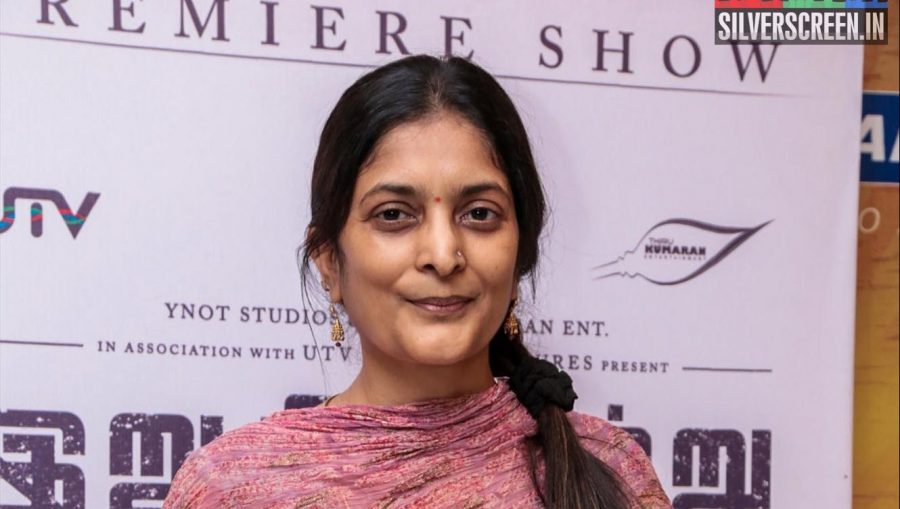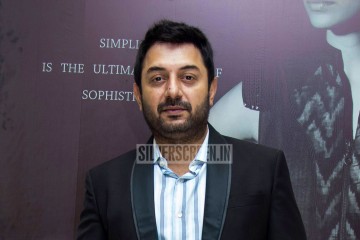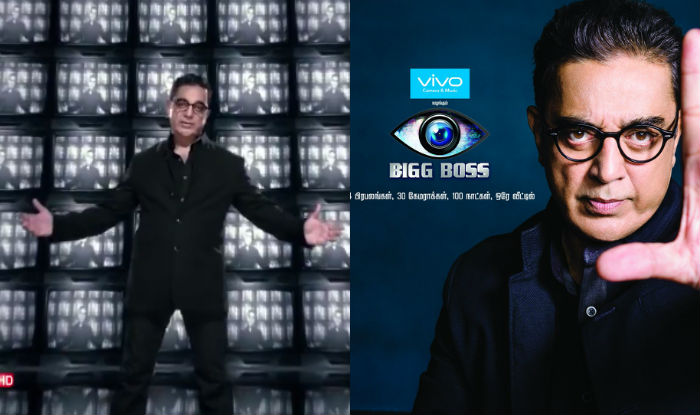Sudha Kongara Prasad is the director of Iruddhi Suttru / Saala Khadoos (2016). She has worked in the Tamil and Telugu industries, as well as in Bollywood. Her debut screenplay Mitr, My Friend (2002), won a National Award for the Best English Film. She has also worked with Mani Ratnam as an Associate Director. We chat with her about Mani Ratnam, being a woman filmmaker, and how she brought authenticity to Iruddhi Suttru.
Sudha Kongara Prasad is on cloud nine. And rightly so. Her film Iruddhi Suttru (Saala Khadoos in Hindi) has galloped ahead of the competition at the box-office. “People tell me that they saw the movie many times. Isn’t that amazing?” she asks.
“It had a meagre 10% opening. On the second and third day, it grew to 85%,” she continues. The Tamil version of the film got rave reviews, but critics weren’t too kind towards its Hindi version. Sudha doesn’t mind. “In Hindi, a few reviews were negative and they overshadowed the good reviews. But there were many extremely positive reviews. For instance, look at Taran Adarsh’s review,” she pauses and continues, “I think there’s a lot of politics involved. And that’s okay.” You can’t help but remember Madhavan’s dialogue in the film, ‘Kill the politics in sports, you’ll find a champion in every street.’
*****
How did you get into filmmaking?
When I was thirteen or fourteen, I watched Mani Ratnam’s Pagal Nilavu (1985). I was bowled over. I guess that’s where it all really began,” Sudha says. “I completed my studies and got married, because I’m from a conservative family. After marriage, my husband encouraged me to pursue my dreams. I did my post-graduation in visual communication. Then I joined Revathi’s team to write the screenplay for her directorial, Mitr, My Friend.
Mitr, My Friend, had a predominantly female cast and crew. The film won the National Award for the Best Feature Film in English in 2002.
I wasn’t just a writer [for Mitr, My Friend]. I was also the first Assistant Director, clapper boy, and much more. Later, a friend of ours, Suresh Balaji, put in a word with Mani Ratnam. He had watched Mitr, and agreed to take me on as an Assistant. But not before trying to talk me out of it. If I were you, he said, I would just go and direct my own film. But I wasn’t confident enough to do something like that. I worked as an AD under his guidance for six and half years.
What’s your biggest takeaway from your tenure with Mani Ratnam?
In hindsight, I didn’t realise I was learning so much. When you are the director, there is this huge crown on your head. As an AD, you don’t have that. And yet, you get to do everything the director does on the sets.You learn everything, without any pressure. For me, those six and a half years was like learning at somebody else’s expense. He was giving me a monthly salary and I was privy to the entire process of filmmaking. From how he develops an idea into a script, to how he executes it. And how he balanced the economics. We were doing production and direction. That was fantastic. It was like going to an IIT or MIT. The best school you can think of.
How does he treat his Assistants?
Mani Ratnam would treat us, Assistants, like family. That was his Rule Number 1. More than the producer, we knew what he was doing on a day-to-day basis. We were privy to everything. We even handled his email. In return, he expected us to put in 100% for the movie. He was not the kind of person who expects you to be on location without him. Every day, he would be the first person to reach the sets. He always pushed himself much harder than he pushed us.
He was so sincere with his work that you could do nothing but try and match his standards.
When I left and started doing my own films, it felt simple. Anybody who has trained under him is well-honed, well-taught. It’s an efficient system, a boot-camp. He was making films with creative and technical finesse in 58-60 days. Other people took 100-150 days, and made inferior films.
Now, when I’m the director, I make sure that I’m the first one on the set.
I went to work with him because I’m a fan. I was fortunate. I idolised him as a kid. Even after 30 years in the industry, this man is still making great films. He’s as strong as he was on his first film.
Mani Ratnam’s films are commercial, but transcend certain aspects of commercial cinema. He doesn’t overspend or overshoot. He is well prepared and his own producer. From him, I learned how to spend economically, and still get the right and effective look on screen.
Did you want to quit at any point?
Yes, many times in the heat of the moment. Mani sir thinks laterally. He wants a lot done. He is a perfectionist, and it’s not easy. You start thinking it’s too difficult. On a difficult day, you might tell yourself, you can have a better life. You think about quitting, and making your own film.
But then, after you’ve assisted him, you can do anything.
I do not want to stop making films because, first of all, I got the chance to be a filmmaker. Not many people make it till here. And secondly, quitting is not something I do with anything in life. I am not a quitter. I want to see things to the end.
My family has not been supportive. Even today, they aren’t supportive. But my husband is very supportive, as long as I complete whatever I am supposed to do at home. Being a creative person, I suffer from frequent mood-swings. But that’s not allowed at home. They just don’t get it. They are those engineering kind of people. So I just keep my mood swings to myself.
Suhasini Maniratnam said at a recent event that men can be really shy with a woman director around.
I find a level of resistance with the men I work with, especially down the ladder. But at higher levels, I have never found difficulties because of my gender. Since my first film didn’t do well, they have this attitude – what does she know anyway? At the ground level, people don’t like it when I point out mistakes. But I fight it out until I win. I am not here to win any ‘popular director’ award.
And they realise that once they do their job perfectly, I am the most peaceful person in the world.
Did you work according to the script, or did you improvise on the sets?
Very rarely did it go beyond the script. Sometimes, when you watch the scene, you might add or subtract a dialogue. But I always make sure the script is perfect.
I share a good rapport with my technicians. The camera work for Iruddhi Suttru was done by Sivakumar Vijayan. He’s passionate about his work. I explain what I want in the frame, and he delivers it in his style.
How did your first film, Drohi (2010), happen?
This was in 2007, after I left Mani Ratnam’s camp. It was a time when corporate and production houses were eager to produce movies. They were all looking for educated, English-speaking people to make films. It was a golden time for us. I chose to do a film with my friend, Mano, who is Gemini’s head. Together we tried to break into the industry. For both of us, it didn’t seem difficult.
We never thought, ‘I am a woman and I can’t do this.’
That’s how Drohi happened. I wanted a grand release. I wanted star value. Because without these you can’t make a cut on your first film. There was flaws in the writing and treatment. Otherwise, I don’t think it was a bad film.
Now, with this movie being a success, I am not basking in it. Instead, I feel an intense sense of relief that I finally got the acceptance I wanted, and I can make my next film. When Drohi flopped, for a day or two, it hit me hard. But then, I decided to keep moving. As soon as I finished the first copy of Drohi, I started working on Iruddhi Suttru.
Why a sports drama?
That’s my favourite genre. I can probably make another ten films in that genre. Rocky is the greatest sports film ever made. My other favourite sports films are Chak de, Lagaan, Raging Bull, Fighter, Wrestler and many others. Such stories just suck me in. The stories about underdogs making it big in sports.
I had this athlete’s story [in my mind] ten years ago, when I was with Mani sir. I have a collection of newspaper clippings of human-interest stories. I came across a story about a family of farmers in a village, who send their daughters to the city for more sporting opportunists. It drew me in. True that at the end of most sports films, the protagonist predictably wins. But as someone said,
a sports film is not about the beginning or the end. It’s about the journey.
It took you around 5 years to make this movie
I knew Madhavan from my days as an Assistant. We discussed the script in 2011. In 2012, Maddie’s [Madhavan’s] injury happened. Later, he went to the US to learn boxing. He asked me if I was willing to wait. I thought, if he could dedicate himself to the movie, why couldn’t I? During that gap, I went to work in Bala’s film as a consultant.
We met producer Shashi, who immediately approved the script. They were not confident about doing the Hindi version because he didn’t know the industry well. We had a hard time finding a producer in Bollywood. So Maddie brought Rajkumar Hirani on board. Hirani said he loved the script. He hired a dialogue writer for the Hindi version. Maddie chipped in too. I think my film is very similar to Hirani’s films. At the end, both our films talk about victory. And goodness.
How did you handle the casting?
Mumtaz Sorcar, who played Lux in the movie, is a terrific actor. I was looking for a girl who could act and do a little boxing. I’ve always wanted to work with Nasser sir. I wanted to see him in a different role – as somebody who complemented this arrogant Haryana coach who had come down south. Kaali Venkat, who played the girls’ father, is a brilliant actor. I saw him in a film and instantly decided that this fellow had to be in my film. And he was willing to do anything for the film. He got a makeover as an aged man and came to my office. I was so impressed.
Recommended
Madhavan played his part brilliantly. On sets, he wasn’t a star. He was willing to do any task. And Ritika lived her character. She knew the dialogues by rote. No one needed prompting on the sets. Her accent was not perfect, but that was okay because her character in the film was partly north Indian. She practised Tamil for two years. She listened to Tamil songs, and slowly picked up the accent.
And Santhosh Narayanan’s music…
I am Santhosh’s fan. But of late, he had started getting a little repetitive. I told him I liked his ‘Naan Nee’ from Madras, and that was the kind of music I wanted. He was very open about it. ‘That is my old style. Let’s go back to it,’ he said.
How did you get the local flavour right?
I am more comfortable speaking and thinking in English. Sometimes, I feel jealous of my colleagues who handle the vernacular language well. I had to really work on it. I would have people fluent in local Tamil come over, and I would read the script out to them. They helped in making the script authentic. By the end of two years, those guys became my bodyguards, gym boys and other workers. I picked up their ways and language.
Ritika’s final test was to sell fish in the fish market. She sold Rs. 500 worth of fish in an hour.
I think that’s the victory. Working on something really hard and convincing people that you aren’t faking it.
The romantic track in the movie worked really well.
I am glad. I wanted to make a sports drama. My focus wasn’t really on the romance part. It may be slightly odd for a teacher to be in love with his student. But I think it’s natural and real. It happens. I know of real-life situations like that.
I love love stories. I want to make romantic-dramas. I think if I ever make a movie at the level of Mani Ratnam’s Mouna Raagam, I would retire happily. Recently, I watched Premam and was swept off my feet. I loved the Malar-George love story. It’s a beautiful drama, treated very realistically.
The Hindi version of the film got a U/A, while the Tamil was given a U.
Yes, because the Hindi version’s title had the word ‘Saala’. When the Tamil version was screened for the censor board, they said they would give it a U because every child should see it and be inspired.
Personally, I think self-censorship is more important.
People are mature enough to know what is good and what is bad for them. But at the same time, it’s important to understand that no two people have the same level of intelligence and sense. Recently, the movie Aligarh was in a censorship controversy because it talks about a subject considered unnatural. But the [regular] media shows us these things. Those aren’t censored. No other form of media is censored like that, and it’s silly to have censorship for films alone.
What’s your favourite type of cinema?
I love biopics and drama. Any human drama, set anywhere. My films will rarely be tragic. What would have happened if Madhi had lost the match at the end of the movie? I don’t want such grief in my films. I want it to make others happy.
There is too much tragedy in real life anyway.
Some of the movies I like are Jigarthanda, Whiplash, Dancer in the Dark, Eternal Sunshine of Spotless Minds, Devdas, Mullum Malarum. I love films made by Mani Ratnam, Sanjay Leela Bhansali, Shimit Amin, and Bala sir. I like Nalan’s [Nalan Kumarasamy] writing. I think he is brilliant. I like Thiyagaraja Kumararaja’s work too. There are a lot of actors I would love to work with. I want to work with Deepika Padukone someday. She is genuinely funny. I like such actors. Juhi Chawla used to be my all-time favourite. Recently, I loved Alphonse Putheren’s Premam. I would love to make that kind of film. It makes one believe in old-fashioned love.
*****



